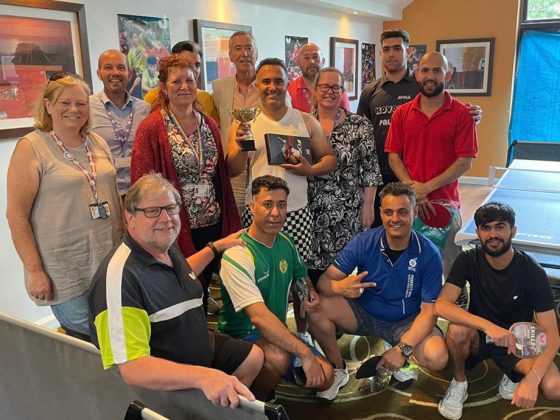A group of asylum seekers residing at a Home Office asylum contingency hotel in Colchester have competed in a table tennis competition.
Organised with the help of Community360, the tournament, which took place during Refugee Week, provided a unique opportunity for asylum seekers to participate in a friendly competition and showcase their talent, as they continue to deal with additional challenges of displacement, social isolation, and uncertainty around their future.
As well as the tournament, two top juniors from the region, Toby McLewin and Luke Davies-Stokes, put on an exhibition match and then played doubles with the winning asylum-seekers.
The event was co-organised by Martyn Green, one of Community360’s transport drivers, who often picks up passengers from the hotel.
Martyn, who is active in the world of table tennis, often stays late to play against the men and used his sporting connections to borrow all the equipment needed for the tournament – including prizes from Table Tennis England.
Rachel Durmishi, Executive lead for Thriving Communities at Community360, said: “The tournament was such a fantastic idea, and I would like to thank Martyn for all his hard work to make the event possible.
“Martyn has created a welcoming safe space where the men could freely take part in sport, enabling them to socialise and interact with each other. I am delighted that we could showcase locally something that’s truly positive and helping them to adjust to their new lives.”
Martyn said: “I was really pleased with the day and it shows what can be done. I hoping it can be a model for other tournaments in other parts of the country.”
Among the spectators watching the contest and presenting trophies were Cllr David King, the leader of Colchester City Council, and Cllr Natalie Sommers, Portfolio Holder for Communities.
Speaking after the event, Cllr Sommers said: “Sport can have a profoundly positive impact on the lives of asylum seekers, providing them with a sense of belonging and a way to connect with others and alleviate feelings of social isolation.
“The individuals and families I met face numerous challenges, such as language barriers, limited access to healthcare and education, social exclusion, and uncertainty around their future. Many are forced to navigate complex legal systems, undergo extensive background checks, and attend numerous interviews to claim asylum.
“The tournament was a powerful reminder of the importance of humanitarian efforts and the role of sport in finding common ground to help support the mental and emotional wellbeing of displaced persons.”





